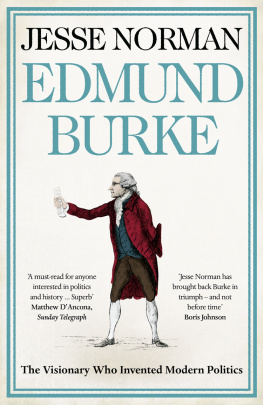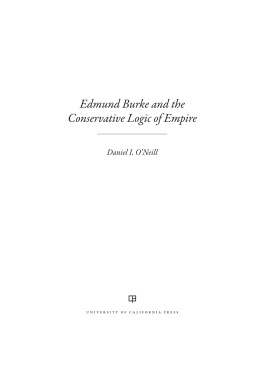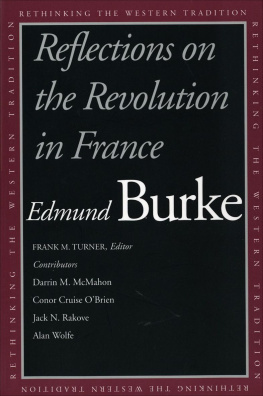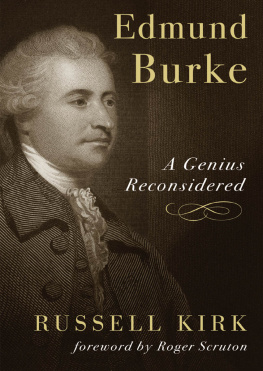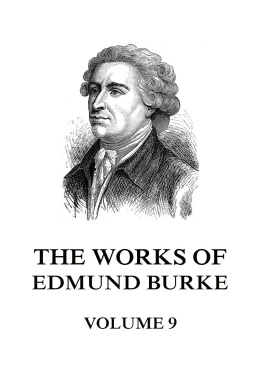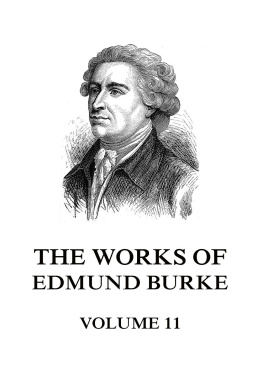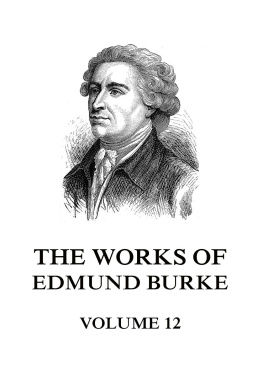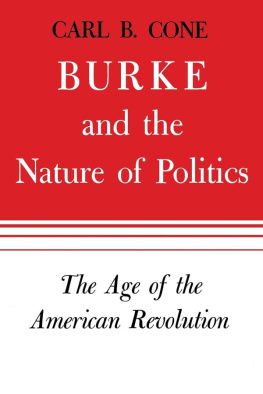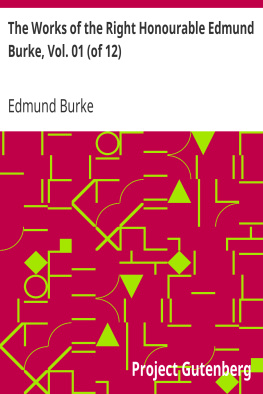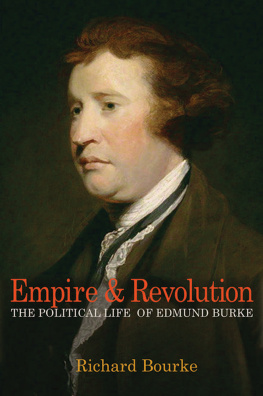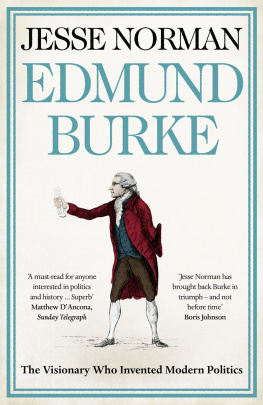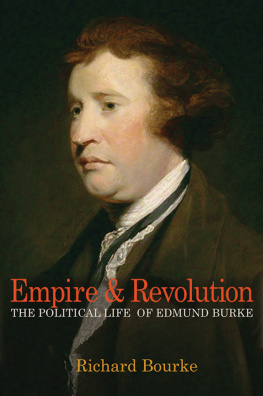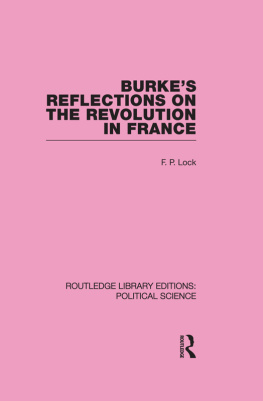Contents
EDMUND BURKE
The Visionary Who Invented Modern Politics

JESSE NORMAN

: Gin Lane, by William Hogarth, etching and engraving, published 1 February 1751 The Trustees of the British Museum
: Idol-Worship or the way to preferment, anonymous, etching, 1740 The Trustees of the British Museum
: A literary party at Sir Joshua Reynoldss, by D. George Thompson, after James William Edmund Doyle, stipple and line engraving, published by Owen Bailey 1 October 1851 National Portrait Gallery, London
: The House of Commons179394, by Karl Anton Hickel, oil on canvas, 17931795 National Portrait Gallery, London
: Portrait of Charles Watson-Wentworth, 2nd Marquess of Rockingham, after Sir Joshua Reynolds, oil on canvas, feigned oval, circa 1768 National Portrait Gallery, London
: Portrait of John Wilkes, by James Watson, after Robert Edge Pine, mezzotint, published 1764 National Portrait Gallery, London
: Portrait of Charles James Fox, by Karl Anton Hickel, oil on canvas, 1794 National Portrait Gallery, London
: Portrait of Edmund Burke, studio of Sir Joshua Reynolds, oil on canvas, circa 1769 or later National Portrait Gallery, London
: Map of India in the time of Clive, in Charles Colbeck (ed.), The Public Schools Historical Atlas, Longmans, Green & Co. (London, 1905)
: Concerto coalitionale, by James Sayers, etching, published by Thomas Cornell 7 June 1785 National Portrait Gallery, London
: The political-banditti assailing the saviour of India, by James Gillray, published by William Holland, hand-coloured etching, published by William Holland 11 May 1786 The Trustees of the British Museum
: Portrait of Warren Hastings, by John Henry Robinson, after Lemuel Francis Abbott, engraving, 1832 Getty Images
: A View of the Tryal of Warren Hastings Esqr. before the Court of Peers, in Westminster Hall, by Robert Pollard (etching) and Francis Jukes (aquatint), after Edward Dayes, etching and aquatint, published by Robert Pollard 3 January 1789 Getty Images
: Smelling out a Rat, by James Gillray, hand-coloured etching, published by Hannah Humphrey 3 December 1790 The Trustees of the British Museum
: Portrait of Richard Burke, by James Ward, after Sir Joshua Reynolds, mezzotint, published by James Ward 5 July 1800 National Portrait Gallery, London
: Thoughts on a Regicide Peace, by James Sayers, etching, published by Hannah Humphrey 14 October 1796 National Portrait Gallery, London
: Promisd Horrors of the French Invasion, by James Gillray, hand-coloured etching and aquatint, published by Hannah Humphrey 20 October 1796 National Portrait Gallery, London
: Portrait of Edmund Burke, by James Barry, oil on canvas, circa 1771, reproduced by kind permission from the Board of Trinity College Dublin, Ireland

EDMUND BURKE IS BOTH the greatest and the most underrated political thinker of the past 300 years. Born in 1730, he came from an extraordinary period in British history, the age of Samuel Johnson, Adam Smith, Edward Gibbon, David Garrick, Joshua Reynolds and David Hume, all of whom were his friends.
Burke was a philosopher-statesman of the first rank, a lifelong campaigner against arbitrary power and injustice, and a fierce champion of fundamental rights and the Anglo-American constitutional tradition. Endlessly lampooned in this, the golden age of caricature, he is nevertheless a figure for the ages. Some understood his greatness at the time: Dr Johnson once remarked that he did not begrudge Burkes being the first man in the House of Commons, for he would be the first man everywhere.
Burke has been all but ignored in recent years, or reduced to a clutch of standard clichs and soundbites. Yet we cannot understand the defects of the modern world today, or modern politics, without him. He is the first great theorist of political parties and representative government, and the first great modern theorist of totalitarian thought. More widely, he offers a compelling critique of what has become known as liberal individualism, and the idea that human well-being is just a matter of satisfying individual wants. To this he joins a perspective with profound implications for many issues now facing policymakers across the globe, including the rise of religious extremism and terror, the atomization of society and loss of social cohesion, the emergence of the corporate state, challenges to the international rule of law, and the nature of revolution itself.
Over his long career Burke fought five great political battles: for more equal treatment of Catholics in Ireland; against British oppression of the thirteen American colonies; for constitutional restraints on executive power and royal patronage; against the corporate power of the East India Company in India; and most famously, against the influence and dogma of the French revolution. Their common theme the inspiration for what W. B. Yeats described in his poem The Seven Sages as Burkes Great Melody is his detestation of injustice and the abuse of power.
In these battles his record of practical achievement was mixed. He often overreached himself, he rarely exercised real political power, and he was variously denounced as vainglorious, a blowhard and an irrelevance. His private life was blighted by debt, which he was unwilling to relieve by the means of self-enrichment usual for the time. He offended King George III by his severe criticisms of royal influence, and by his support for a regency during the Kings period of madness. A man of enormous personal warmth and good humour, he lost friends and supporters by his near-obsessive insistence on the campaigns of the moment.
Yet in intellectual terms the extraordinary fact is not that Burke was occasionally wrong, but that he was so often right. Not only that, he was right for the right reasons not through luck but because his powers of analysis, imagination and empathy gave him an extraordinary gift of prophecy. Thus he anticipated many of the effects of British rule in Ireland; the loss of the American colonies; the overreach of the East India Company; and the disastrous consequences of revolution in France. Modern conceptions of social capital and human well-being have their proper place within his thought, and his vision of community, free institutions and civic virtue still has profound and unrecognized implications for politicians today. Lord Randolph Churchill, father of Winston, once summarized Disraelis life as Failure, failure, failure, partial success, renewed failure, ultimate and complete triumph. The same might be said of Edmund Burke.
There are many reasons for the recent neglect of Burke. He is not an executive politician, like a Pitt or a Peel, and his story is more one of intellect and imagination than of political achievement. His thought is multifarious and scattered across a vast array of pamphlets, speeches and letters, from which it must be quarried by the patient scholar. He is a master of English prose but remains somewhat alienated from current literary or academic debates, in part because he was a working politician, and so perhaps a victim of the distaste that politics often inspires. And he deliberately withholds himself: as he wrote at the age of sixteen to his best friend Richard Shackleton, We live in a world in which everyone is on the catch, and the only way to be safe is to be silent, silent in any affair of consequence, and I think it would not be a bad rule for every man to keep within what he thinks of others, of himself, and of his own affairs. Burkes speeches, his writings and even his letters are notably short on confidences, gossip or personal colour. This is far removed from the modern confessional style.
Next page
